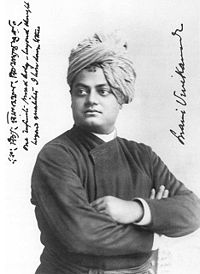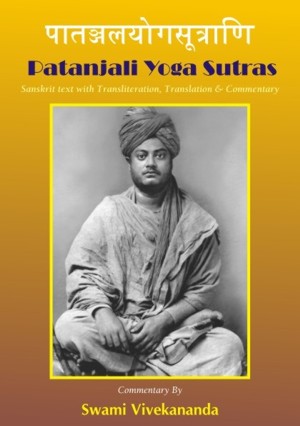CHAPTER IV - KAIVALYA PADA
INDEPENDENCE
॥ चतथु्य कैवल्यऩाद् ॥
Kaivalya-Pāda
1. जन्मौषणधभन्त्रतऩ्सभाणधजा् णसद्धम् ॥ १॥
janma-oṣadhi-mantra-tapas-samādhi-jāḥ siddhayaḥ ||1||
The Siddhis (powers) are attained by birth, chemical means, power of words, mortification or concentration.
Sometimes a man is born with the Siddhis, powers, of course from the exercise of powers he had in his previous birth. In this birth he is born, as it were, to enjoy the fruits of them. It is said of Kapila, the great father of the Sankhya Philosophy, that he was a born Siddha, which means, literally, a man who has attained to success.
The Yogis claim that these powers can be gained by chemical means. All of you know that chemistry originally began as alchemy; men went in search of the philsopher’s stone, and elixirs of life, and so forth. In Inidia there was a sect called the Rasayanas. Their idea was that ideality, knowledge, spirituality and religion, were all very right, but that the body was the only instrument by which to attain to all these. If the body broke now and then it would take so much more time to attain to the goal. For instance, a man wants to practice Yoga, or wants to become spiritual. Before he has advanced very far he dies. Then he takes another body and begins again, then dies, and so on, and in this way much time will be lost in dying and in being born again. If the body could be made strong and perfect, so that it would get rid of birth and death, we should have so much more time to become spiritual. So these Rasayanas say, first make the body very strong, and they claim that this body can be made immortal. The idea is that if the mind is manufacturing the body, and if it be true that each mind is only one particular outlet to that infinite energy, and that there is no limit to each particular outlet getting any amount of power from outside, why is it impossible that we should keep our bodies all the time? We shall have to manufacture all the bodies that we shall ever have. As soon as this body dies we shall have to manufacture another. If we can do that why cannot we do it just here and no, without getting out? The theory is perfectly correct. If it is possible that we live after death, and make other bodies, why is it impossible that we should have the power of making bodies here, without entirely dissolving this body, simply changing it continually? They also thought that in mercury and in sulphur was hidden the most wonderful power, and that by certain preparations of these a man could keep the body as long as he liked. Others believed that certain drugs could bring powers, such as flying through the air, etc. Many of the most wonderful medicines of the present day we owe to the Rasayamas, notably the use of metals in medicine. Certain sects of Yogis claim that many of their principal teachers are still living in their old bodies. Patanjali, the great authority on Yoga, does not deny this.
The power of words. There are certain sacred words called Mantrams, which have power, when repeated under proper conditions, to produce these extraordinary powers. We are living in the midst of such a mass of miracles, day and night, that we do not think anything of them. There is no limit to man’s power, the power of words and the power of mind.
Mortification. You will find that in every religion mortifications and asceticisms have been practised. In these religious conceptions the Hindus always go to the extremes. You will find men standing with their hands up all their lives, until their hands wither and die. Men sleep standing, day and night, until their feet swell, and, if they live, the legs become so stiff in this position that they can no more bend them, but have to stand all their lives. I once saw a man who had raised his hands in this way, and I asked him how it felt when he did it first. He said it was awful torture. It was such torture that he had to go to a river and put himself in water, and that allayed the pain for a little. After a month he did not suffer much. Through such practices powers (Siddhis) can be attained.
Concentration. The concentration is Samadhi, and that is Yoga proper; that is the principle theme of this science, and it is the highest means. The preceding ones are only secondary, and we cannot attain to the highest through them. Samadhi is the means through which we can gain anything and everything, mental, moral or spiritual.
2. जात्यन्तयऩणयिाभ् प्रकृत्याऩयातू ॥् २॥
jāty-antara-pariṇāmaḥ prakṛty-āpūrāt ||2||
The change into another species is by the filling in of nature.
Patanjali has advanced the proposition that these powers come by first, sometimes by chemical means, or they may be got by mortification and he has admitted that this body can be kept for any length of time. Now he goes on to state what is the cause of the change of the body into another species, which he says is by the filling in of nature. In the next aphorism he will explain this.
3. णनणभत्तभ अप्रमोजकं्प्रकृतीनांवयिबदस्ते ुतत् णत्रकवते॥३॥्
nimittam-aprayojakaṁ prakṛtīnāṁ-varaṇa-bhedastu tataḥ kṣetrikavat ||3||
Good deeds, etc., are not the direct causes in the transformation of nature, but they act as breakers of obstacles to the evolutions of nature, as a farmer breaks the obstacles to the course of water, which then runs down by its own nature.
When a farmer is irrigating his field the water is already in the canals, only there are gates which keep the water in. The farmer opens these gates, and the water flows in by itself, by the law of gravitation. So, all human progress and power are already in everything; this perfection is every man’s nature, only it is barred in and prevented from taking its proper course. If anyone can take the bar off in rushes nature. Then the man attains the powers which are his already. Those we called wicked become saints, as soon as the bar is broken and nature rushes in. It is nature that is driving us towards perfection, and eventually she will bring everyone there. All these practices and struggles to become religious are only negative work to take off the bars, and open the doors to that perfection which is our birthright, our nature.
To-day the evolution theories of the Yogis will be better understood in the light of modern research. And yet the theory of the Yogis is a better explanation. The two causes of evolution advanced by the moderns, viz., sexual selection and survival of the fittest, are inadequate. Suppose human knowledge to have advanced too much as to eliminate competition, both from the function of acquiring physical sustenance and of acquiring a mate. Then, according to the moderns, human progress will stop and the race will die. And the result of this theory is to furnish every oppressor with an argument to calm the qualms of conscience, and men are not lacking, who, posing as philosophers, want to kill out all wicked and incompetent persons (they are, of course, the only judges of competency), and thus preserve the human race! But the great ancient evolutionist, Patanjali, declares that the true secret of evolution is the manifestation of the perfection which is already in every being; that this perfection has been barred, and the infinite tide behind it is struggling to express itself. These struggles and competitions are but the results of our ignorance, because we do not know the proper way to unlock the gate and let the water in. This infinite tide behind must express itself, and it is the cause of all manifestation, not competition for life, or sex gratification, which are only momentary, unnecessary, extraneous effects, caused by ignorance. Even when all competition has ceased this perfect nature behind will make us go forward until everyone has become perfect. Therefore there is no reason to believe that competition is necessary to progress. In the animal the man was suppressed, but, as soon as the door was opened, out rushed man. So, in man there is the potential god, kept in by the locks and bars of ignorance. When knowledge breaks these bars the god becomes manifest.
4. णनभािणचत्तान्यणस्मताभात्रातय ॥् ४॥
nirmāṇa-cittāny-asmitā-mātrāt ||4||
From egoism alone proceed the created minds.
The theory of Karma is that we suffer for our good or bad deeds, and the whole scope of philosophy is to approach the glory of man. All the Scriptures sing the glory of man, of the soul, and then, with the same breath, they preach this Karma. A good deed brings such a result, and a bad deed such a result, but, if the soul can be acted upon by a good or a bad deed it amounts to nothing. Bad deeds put a bart to the manifestation of our nature, of the Purusa, and good deeds take the obstacles off, and its glory becomes manifest. But the Purusa itself is never changed. Whatever you do never destroys your own glory, your own nature, because the soul cannot be acted upon by anything, only a veil is spread before it, hiding its perfection.
 Swami Vivekananda
Swami Vivekananda
